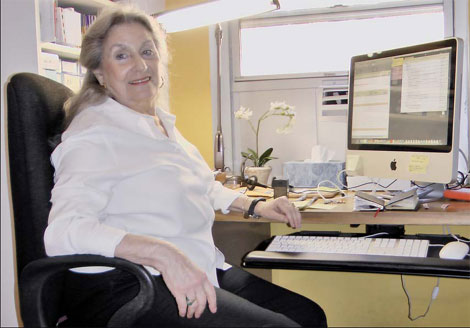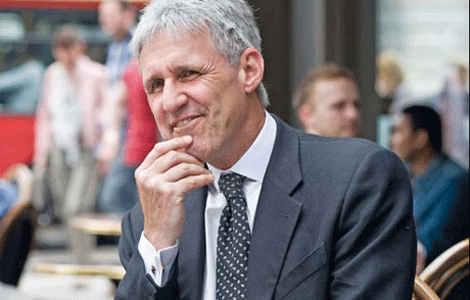Analyze this
Updated: 2011-09-16 08:55
By Chen Weihua (China Daily)
|
|||||||||
|
Psychiatrist Elise Snyder says helping Sichuan earthquake victims is a way of living an active life. Chen Weihua / China Daily |
New York veteran psychiatrist goes online to teach Chinese doctors and help quake victims
Freudian psychiatrist Elise Snyder lives close to New York's Chinatown and has always enjoyed her neighborhood's Asian vibe. Thanks to technology, East is really meeting West, online, and on a daily basis, as she teaches China-based psychoanalysts from her Manhattan apartment.
Snyder, 77, should be enjoying retirement, but now volunteers 60 hours of her time each week from her tiny home office, communicating via Skype, with a new generation of Chinese mental health professionals.
And her grief counseling skills, and those of her students, have already helped many Chinese, who suffered devastation in the 2008 Sichuan earthquake.
"This is the way these Chinese psychoanalysts could really make a difference working in a country where people want this service," Snyder says. "For old people like me, it's a way of living an active and exciting life."
Helping Chinese health professionals is a relatively new passion for Snyder, who first went to China in 2001 with her husband to attend an academic conference.
Freudian-style psychoanalysis has waned in the US over the past two decades, but Snyder discovered it was becoming popular in China. She held a public lecture in Chengdu, in Sichuan province, and about 200 people packed the auditorium.
After more China trips, some of her followers asked her to teach them, analyze them, and be their supervisor. But how could this be possible from the other side of the world?
"You can do via Skype," one student suggested.
Snyder had never heard of Skype but gave it a try and after analyzing a patient via the Internet for the first time, a new world opened for her.
As more requests for teaching and treatment came her way, she realized there was a need to set up an organized system of training and mobilize her guanxi (relationships) in the psychoanalytical community.
In 2006, Snyder founded the non-profit China American Psychoanalytic Alliance (CAPA). Two years later, CAPA started to offer training programs in China, using the rich pool of its 200-plus members, most of who were experienced psychoanalysts in the US.
Snyder admits that teaching via Skype was a challenge for some in the beginning since many psychoanalysts were people of her age and relatively computer shy.
But soon enough, all felt the rewards of giving their time and expertise. The eagerness of the Chinese students to learn the skill played a big role in impressing psychoanalysts to teach the "very hard-working students".
CAPA now has 160 students and its first class of 30 graduated from its two-year program in October last year. That same month, the International Psychoanalytical Association, founded by Sigmund Freud in 1910, held its 100th anniversary meeting in Beijing.
Freudian ideas were first introduced to China in the early 20th century but were banned during the "cultural revolution" (1966-76), resulting in generation gap of psychoanalysts and psychiatrists. The theory was revived in the 1980s when it triggered interest on college campuses.
Snyder will lead a group of 25 people to China in October to preside over the graduation ceremony of the second CAPA class of 40 students. It is an annual group tour when US teachers meet their students face to face and give lecturers, as well as see the sites.
Ji Xuesong, a psychiatrist at the No.6 Hospital of Beijing University and one of the first CAPA students, says his career has been strengthened. "The CAPA program is the most systematic psychoanalysis training Chinese professionals receive so far," he says.
Ren Zhengjia, a psychotherapist at West China Hospital of Sichuan University and also a CAPA student, says the program helps students better understand human nature.
"It also teaches hands-on techniques and helps therapists to understand themselves," says Ren.
Deng Hong, a CAPA student and psychotherapist at West China Hospital, says she also benefits greatly from the program, both professionally and also as way of improving his language skills.
Deng and Snyder shared an important experience together in helping people suffering from the 2008 Sichuan earthquake. A week after the quake, Snyder arrived in Chengdu, helping train teachers, government officials and volunteer workers who were assisting traumatized people.
A total of 2,000 people were trained under CAPA auspices following the quake.
Remembering vividly that "the earth was still shaking in those days", Snyder was proud that some CAPA students, such as Deng Hong, are still working with traumatized people there.
Ren and Deng, who both have many years of clinical experience, dismiss reports by Western media that the government authorities were making it difficult for Chinese seeking psychoanalytical treatment.
"It's totally ungrounded. Every factor, such as family, social relationship, personal relationship at work units and politics, plays a role. They are interconnected," says Deng, once a visiting scholar at Harvard School of Public Health.
Snyder agrees that complaints and symptoms of Chinese patients are not really different from those of American patients. Family and work issues were the majority of concerns.
While China's political campaigns decades ago inflicted psychological trauma to the older generation, it is mostly the phenomenal social transformation over the past 30 years that has caused most of the current mental health issues.
Intensive competition in the school and workplace, the loosening of social and family values and an increasingly materialistic society all are placing a huge burden on people's psychology.
Happiness, a topic that has long been forgotten or measured only by material wealth, has now become a new hot topic these days to measure the quality of life of a person and in a city.
Michael Blumenfield, professor emeritus at New York Medical College and president elect of American Academy of Psychoanalysis and Dynamic Psychiatry, describes Snyder as a "remarkable woman" who almost single-handedly developed CAPA and persuaded scores of very well trained psychiatrists to participate on a voluntary basis.
"Because of historical circumstances there was an absence of a generation of Chinese psychotherapists who were trained in psychoanalytic and psychodynamic therapy. The CAPA program fills that void and allows Chinese therapists to receive this training," say Blumenfield, who teaches and supervises CAPA students via Skype.
"They are then able to offer this valuable form of treatment to the Chinese people who might benefit from it."
(China Daily 09/16/2011 page21)











